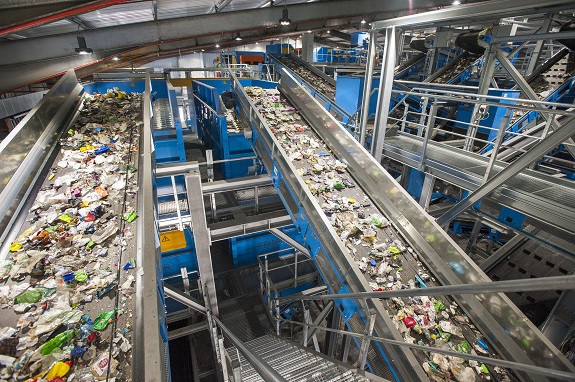The body representing Europe’s recycling businesses has said there is ‘room for improvement’ in the methodology for measuring recycling rates backed by the European Parliament on Tuesday.
MEPs voted to support amendments to the EU’s Circular Economy package as part of ongoing negotiations over the measures that will replace existing targets and requirements in the waste framework, packaging and landfill directives (see letsrecycle.com story).

Output material from sorting plants such as MRFs should be counted towards recycling rates, waste companies have argued
Among the amendments approved were changes to the proposed recycling target to 2030, upping the goal from a 65% level as backed by the European Commission and returning to the 70% ambition first proposed by the former Environment Commissioner Janez Potocnik in 2014.
As well as voting for a higher recycling target, MEPs have also backed proposals to change the way in which progress towards recycling targets is measured – to adopt a ‘harmonised’ methodology for recording recycling across all EU member states.
This would include changing the wording of laws which allow materials from sorting facilities to count towards final recycling tonnages.
Methodology
Presently, EU members can use one of four proposed methods to chart progress towards recycling targets, which critics have claimed has led to a ‘fragmented’ picture of progress on waste and recycling across the continent.
In its initial proposals, outlined at the end of 2015, the European Commission had intended for recycling to be counted at the point of input into the final recycling process, or through a derogation, the output of a sorting operation provided it is sent to a final recycling process.
However, the European Parliament has voted to remove the derogation, agreeing on wording which defines the final recycling process as when: “no further sorting operation is needed and waste materials are effectively reprocessed into products, materials or substances” – in essence, when the material enters a manufacturing process.
EuRIC
But, European Recycling Industries’ Confederation (EuRIC), which represents recycling federations from 20 EU countries, has claimed that the option backed by the European Parliament “falls short on two major aspects”.
The organisation claims that the proposal ‘confuses two distinct steps in the value chain – namely recycling and manufacturing’ and has added at the manufacturing stage it is difficult to trace the origin of waste streams for which targets have been set.
“During trilogues, it is crucial that Member States and the European Parliament ensure that the rules to measure recycling targets will not create more confusion and loopholes but rather agree on a method able to deliver robust and comparable statistics across the EU.”
Emmanuel Katrakis
EuRIC
Commenting on the proposals, Emmanuel Katrakis, secretary general of EuRIC, said: “In other words, measuring recycling targets at the input of production processes runs against the objective of accurate and uniform statistics across the EU. During trilogues, it is crucial that Member States and the European Parliament ensure that the rules to measure recycling targets will not create more confusion and loopholes but rather agree on a method able to deliver robust and comparable statistics across the EU.”
Europe’s waste management industry – represented by the European Federation of Waste Management and Environmental Services (FEAD) – has also expressed a preference for an option to count recycling at the sorting stage, claiming that this ‘better reflects the realities of how recyclable waste is collected’.
In a statement following Tuesday’s vote, the organisation said: “Whereas the EP decided to adopt a calculation method based on one single point of measurement in view of achieving the recycling target, FEAD counts upon the member states, who will have to implement it, to maintain the “output of sorting” as proposed by the EC as a practical calculation method.
“The “output of sorting” is vital as it better reflects the realities of how recyclable waste is collected, sorted and presented to re-processors. Depending on the waste flows and where the waste material will effectively be reprocessed, it is also the point at which harmonisation at EU level can be best reached.”
Trilogue
Amendments approved by the MEPs will now be assessed by Member State governments before being considered by European ministers. ‘Trilogue’ negotiations on the proposals between the European Council of Ministers, MEPs and the Commission are expected to commence in the coming months.

The Circular Economy package will be adopted by EU member states – including potentially the UK – after agreement is reached between ministers, MEPs and the European Commission
The UK’s Environmental Services Association – itself a member of FEAD has pledged to continue lobbying ministers over the changes, after claiming that the recycling calculation methodology adopted by the Parliament is ‘virtually impracticable’.
ESA’s executive director Jacob Hayler, said: “ESA will look to the Commission and the Council to address the need for sustainable markets for secondary raw materials, and to put realism and practicability back into the Circular Economy legislation, when the three-way Trilogue discussions get underway. This is vital if the industry is to have a sound basis for future investment.”
Despite criticism of the harmonisation methodology from a number of quarters, Ray Georgeson, chief executive of the Recycling Association – which represents UK reprocessors has offered a defence of the proposals.
He said: “We maintain the view that recycling should be calculated at the point where materials go for final recycling and concur with Simona Bonafè on this important issue. If the European Commission and Council ultimately find they cannot cope with the logic of this position, they at the very least should do the decent thing and reframe the description of their headline recycling targets as what they actually are – collection targets, not recycling targets. This is a level of transparency and integrity we would welcome.”
The post ‘Room for improvement’ in EU recycling definition appeared first on letsrecycle.com.
Source: letsrecycle.com Waste Managment


